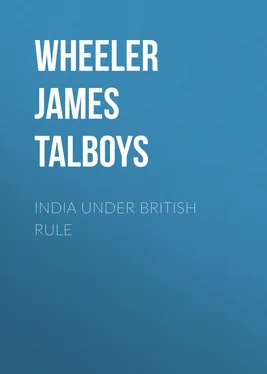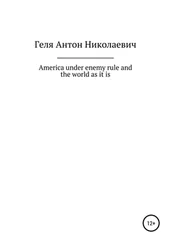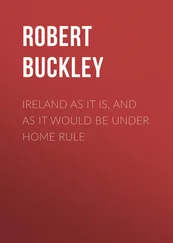British advance: massacre at Patna, 1763.
An avenging army was soon on its way from Calcutta. Murshedabad was captured, but not without a stout resistance, for the drilled troops of the Nawab were vastly superior to the rabble hosts that had fought at Calcutta and Plassy. The British force, however, overcame every obstacle, and pushed on to Monghyr, whilst the Nawab fled to Patna, carrying his prisoners with him to the number of a hundred and fifty souls. At Patna the Nawab heard that Monghyr was taken by the British, and resolved on exacting a terrible revenge. His prisoners were shut up in a large square building with a courtyard in the centre. He ordered Sombre to slaughter the whole, and the miscreant environed the building with sepoys. The British assembled in the courtyard, bent on fighting for their lives. The sepoys climbed to the roof, but were assailed with a storm of brickbats and bottles from the courtyard. Sombre ordered them to fire on the prisoners, but they hung back, declaring that they were sepoys and not executioners, and would not fire on men without arms in their hands. Then Sombre grew furious and violent; struck down the nearest sepoys with his own hands, and threatened and bullied the rest into obedience. The sepoys yielded to their European master. Successive volleys were fired into the courtyard, until it was strewed with dead bodies. Not a single prisoner escaped that horrible slaughter.
Mir Kasim and the Nawab Vizier.
The massacre at Patna sealed the doom of the Nawab. He fled away into Oudh with his family and treasures, but the avenging Furies were at his heels. The Nawab Vizier received him with ostentatious hospitality, but only that he might strip him of his treasures. The Nawab Vizier declared war against the British for the restoration of Mir Kasim, but it was only that he might eventually get the Bengal provinces into his own hands.
Battle of Buxar, 1764.
The war lasted many months, but was brought to a close in 1764 by the battle of Buxar. The victory gained by Sir Hector Monro at Buxar on the Behar frontier was as decisive as that of Plassy. The Nawab Vizier fled away in terror to the Rohilla Afghans beyond his north-west frontier, leaving his dominions at the absolute disposal of the British; and Sir Hector Monro marched on to the capital at Lucknow and took possession of the whole of Oudh.
British triumph.
The triumph of the British was complete. Mir Kasim lost his treasures and died in obscurity. The Nawab Vizier was a helpless fugitive; neither Rohillas, nor Mahrattas, nor any other power could help him against the British. The Great Mogul was once more a suppliant in their hands. The British were de facto masters of the bulk of the old Mogul empire, and might have taken possession of the whole of Northern India in the name of the Great Mogul. As it was they proposed making over Oudh to the Afghans, and restoring the Great Mogul to the throne of his fathers at Delhi. Before, however, the Governor and Council at Calcutta could change the map of India, the Court of Directors upset their plans by sending out Clive for the last time with the authority of a dictator.
Lord Clive Dictator, 1765.
§4. The Directors of the East India Company had been alternately infuriated and terrified at the news from Bengal. They were extremely angry at the quarrel about the private trade, especially as they had not shared in the profits; but the massacre at Patna filled them with grief and despair. Accordingly Clive, who had been raised to the peerage, was sent to Bengal as Governor, with full power to act as he thought proper.
Settlement of Oudh.
When Lord Clive landed at Calcutta Mir Jafir was dead, and the existing Governor and Council had sold the throne of the three provinces to an illegitimate son for 200,000 l. and divided the money amongst themselves. Lord Clive was extremely wroth, but could do nothing. The offenders retired from the service of the Company and returned to England. Meanwhile Lord Clive stopped the expedition to Delhi, restored Oudh to the Nawab Vizier, and secured a handsome sum out of the transaction for the benefit of the East Indian Company.
Company acquire Bengal, Behar, and Orissa, 1765.
But the crowning event in Lord Clive's life was the acceptance of the post of Dewan to the Great Mogul in the name of the East India Company. Henceforth, the Governor and Council at Calcutta took over the revenues of Bengal, Behar, and Orissa from the Nawab's revenue officers, and provided for the military defence of the three provinces. A quarter of a million sterling was paid to the Great Mogul, and half a million to the Nawab at Murshedabad for the salaries of himself and his officials; but all interference on the part of the British with the administration of the Nawab and his ministers and servants was strictly forbidden, as contrary to the policy of non-intervention. Accordingly, the Nawab and his officials were left to govern the country in their own fashion, without a revenue and without an army.
Sorrows of the Great Mogul.
The Great Mogul, however, was not content. He would not live in the Bengal provinces; he wanted to go to Delhi, and he was sulky because the British would not take him there. He set up his little court at Allahabad, half-way between Calcutta and Delhi, and lived like a prince; but he was unhappy. A British brigade was posted hard by, and the officer in command would not allow him to support his imperial dignity by beating the imperial kettledrums, because of the noise.
Agony of Bengal, 1765-72.
The arrangements as regards the Bengal provinces, known in India as the acquisition of the Dewanny, were carried out in 1765. In 1767 Lord Clive returned to England, and the Bengal provinces were reduced to greater misery than ever. There was no one to control the native officials, and they accumulated riches at the expense of the masses. The wealth which the old Nawabs had lavished on their pleasures was at least spent within the three provinces; whereas it was now sent to China to buy tea and silk for the East India Company, or was remitted to England as the private fortunes of the Company's servants. Bengal was drained of its silver, and the masses loudly complained that the British ought to protect them against their oppressors. But non-intervention was the cry both in Bengal and in the British Isles, and nothing was done.
British supervisors.
Meanwhile the revenue had rapidly declined. Before Lord Clive left Bengal he was compelled to do something in spite of his policy of non-intervention. He sent a British civil servant to every district in the Bengal provinces, under the name of Supervisor. The supervisors were to watch and report what was going on, but not to interfere with the Bengali officials. 8 8 In the present day there are forty-five districts in the Bengal provinces, namely, thirty-seven regulation and eight non-regulation. The distinction between the two classes of districts will be explained hereafter.
They were to collect statistics respecting the land, its produce and capacity; the authorised amount of land revenue and the illegal exactions; the administration of justice and the regulation of trade. The British supervisors could only report what they saw, and what the native officials chose to tell them. One thing was certain: the people were terribly oppressed and the administration was in utter confusion; and so long as the British played at non-intervention it was impossible to apply a remedy.
Famine, 1770-71.
At last the dreadful famine of 1770-71 desolated and depopulated the whole country. Terrible reports reached England that the Company's servants had leagued with the native officials to buy up all the grain and sell it at famine prices. Meanwhile the revenue had rapidly declined, and the blame was thrown on the Bengali officials. Accordingly the Court of Directors resolved to dismiss the Asiatic officials, and to appoint covenanted British servants in their room; and they selected Warren Hastings to be Governor of Bengal, with peremptory orders to carry out the necessary reforms.
Читать дальше












